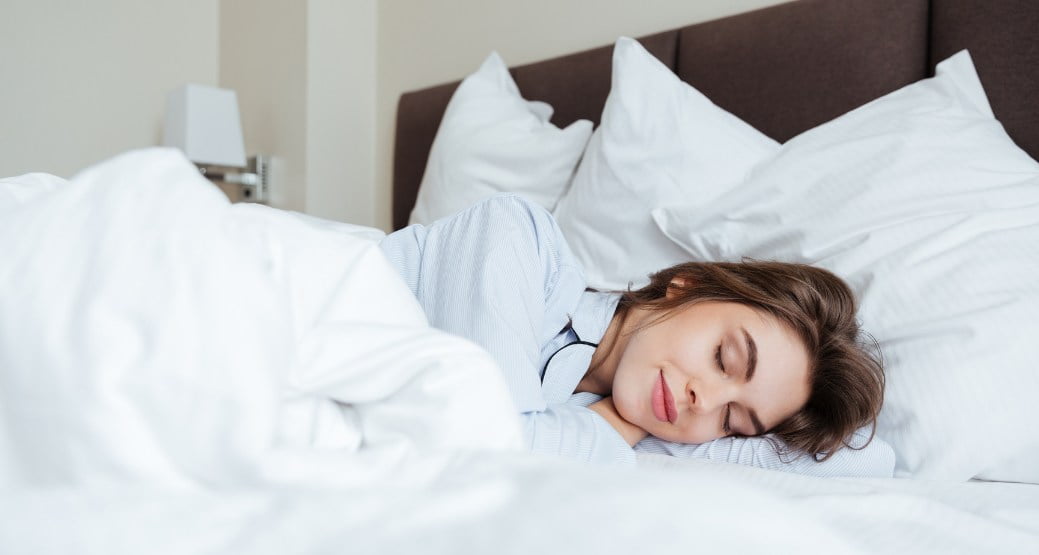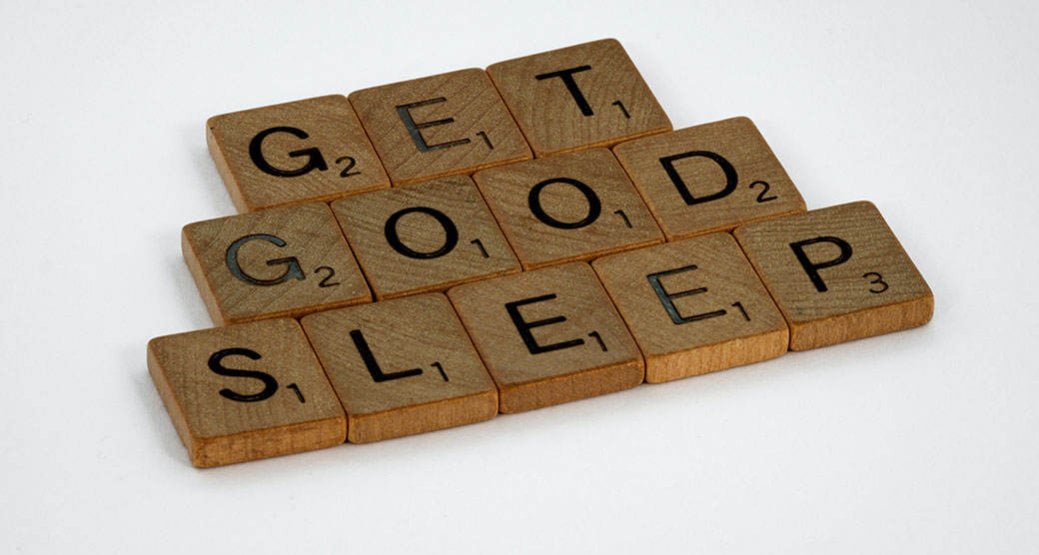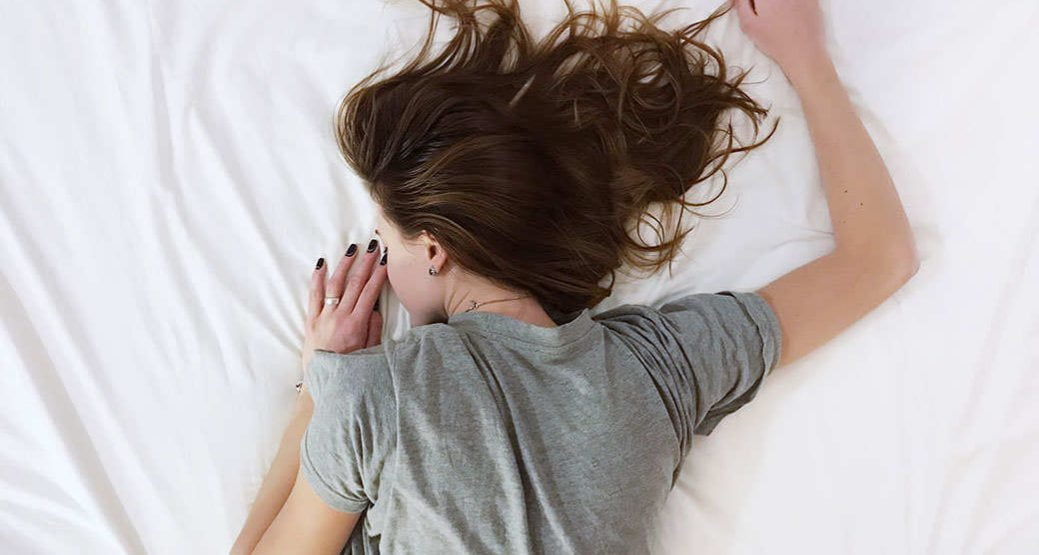Health Benefits of Getting Enough Sleep

Sleep. Wonderful, beautiful sleep. Something we really wish we had valued more as a kid. Why is it that kids fight naptime and bedtime so much? When as an adult, all we want to do is implement nap time into our busy workdays and go to bed as early as possible. Sometimes it feels like we can never get enough sleep. But how much sleep is actually enough?
Unfortunately, sleep seems to be one of the easiest things to sacrifice when making room for our busy schedules and responsibilities. While every person’s health is different, The Sleep Foundation recommends that healthy adults between the ages of 26-64 years old receive 7-9 hours of sleep each night. Check out the Sleep Foundation’s sleep chart to see sleep recommendations for every age group.
After learning the recommended hours of sleep you need each night, do you feel like you get enough sleep? Creating healthy sleeping habits is vital to ensuring you are getting enough sleep each night. If you have trouble falling asleep at night, check out these helpful tips to ensure you get a relaxing and full night’s sleep and learn several health benefits of getting enough sleep.
Are You Getting a Good Night’s Sleep?

Do you feel like you get enough sleep each night? Even when you go to bed at a reasonable hour, do you have trouble falling asleep? Do you feel rested when you wake up? If you don’t think that you are getting enough sleep each night, you might want to consider focusing on your sleep hygiene.
What is Sleep Hygiene?

Sleep hygiene is creating healthy and lasting habits that ensure you have a consistent daytime and bedtime routine that encourages healthy sleeping habits. While sleep hygiene is helpful for everyone, your sleep hygiene will be unique to suit your lifestyle and your body’s needs. And it may take a few adjustments before you find the sleep routine that works best for you.
What Are Your Daytime Habits?

If you struggle to fall asleep and stay asleep throughout the night, take a look at your daytime routine. Do you take long naps or drink a lot of caffeine late in the day? Do you eat heavier meals close to bedtime or fall asleep watching television? While every person is different, these are all things that can have a negative effect on how you sleep. Consider changing one habit at a time to see what makes the most significant difference in how you sleep. Changing just one thing can help you implement healthy sleeping habits into your nighttime routine.
Create a Bedtime Routine

There’s a reason it’s so important to create a consistent bedtime routine for babies and toddlers. It works! And the same goes for adults! Create a bedtime routine that fits your schedule and needs, and stick to it as much as possible. Try to start your bedtime routine at the same time each night so that your body begins naturally relaxing and preparing for sleep.
Turn off all screens before starting your bedtime routine, including your phone. Place your phone on the charger and turn your phone to the Do Not Disturb setting if that is helpful for you. If possible, dim the lights in your bedroom and bathroom to help create a more relaxing atmosphere. Diffuse relaxing oils like lavender and make sure your room is a comfortable temperature for sleep. Creating a comfortable and healthy bedtime routine can make such a difference in the quality of sleep you receive each night.
Design and Organize Your Room for Better Sleep

One way to create healthy sleeping habits is by keeping your sleeping area tidy! If your room is typically full of clutter, you may want to rethink your organizing strategy. CPAP.com says, “According to scientists, bedroom clutter can negatively affect our rest in many respects, making it more difficult to fall and stay asleep.” Have a place for everything in your room to make it easy to keep things neat and organized. Take ten minutes before you start your bedtime routine to tidy your bedroom.
Keep a lamp on your nightstand to turn off your overhead light to eliminate harsh lighting while you get ready for bed. Invest in blackout curtains to prevent natural light from waking you up before getting enough sleep. Make sure you have a comfortable bed and bedding that is inviting and encourages sleep. Implementing these changes can make a huge difference in how you sleep each night.
Health Benefits of Getting Enough Sleep

Sleep isn’t just to help us relax. Did you know there are many health benefits of getting enough sleep? Prioritizing sleep is essential for your physical and mental health. There’s a reason parents plan their lives around a toddler’s nap time. Their little bodies grow while they sleep, but their minds also need plenty of rest, or they go into a total meltdown. As adults, we may not grow the same way a toddler is, but our bodies and our minds rely on sleep to heal and rejuvenate. We need to create and implement healthy sleeping habits for ourselves just like we do for our kids.
“The term “sleep on it” is accurate because rest improves your ability to make decisions. Working too long without rest reduces your concentration and can depreciate your emotional capacity.” – Heather Cherry, Forbes
Sleep Improves Your Immune System

Keeping your immune system strong and healthy should be a priority for everyone. Taking vitamins, exercising, and maintaining a healthy diet are all crucial to staying healthy. But what about getting enough sleep? There’s a reason your doctor always encourages getting plenty of rest when you’re sick. Your body needs sleep to heal and stay healthy! According to the Chicago Tribune, “While you sleep, your body can make more white blood cells that can attack viruses and bacteria that can hinder the healing process. Your immune system relies on sleep to be able to fight harmful substances.”
When your body lacks sleep, it sends warning signs of feeling run down and exhausted. These warning signs are your body’s way of telling you that you need to prioritize sleep immediately! So, the next time you consider sacrificing sleep to make time for something else, consider if it’s worth risking the many health benefits of getting enough sleep.
Getting Enough Sleep Improves Your Mood

We all know how miserable it feels not to get enough sleep at night. Whether you chose to stay up late binging your favorite show or you just had trouble falling asleep, hearing your alarm go off before your body has had enough sleep is beyond frustrating. Not getting enough sleep prevents you from thinking clearly and increases irritability. Continued sleep deprivation can harm your work performance and personal life and can lead to more serious health issues later in life.
Consult with your doctor If you are concerned about your sleep habits, have trouble falling asleep, or feel you aren’t getting enough healthy sleep each night.
Do you get enough sleep each night? Do you have trouble falling asleep or staying asleep each night? What tip to get better sleep stood out to you the most? Do you already practice a consistent bedtime routine? Were you aware of the health benefits of getting enough sleep? We would love to hear from you! Leave us your thoughts in the comment section below!






Leave A Comment